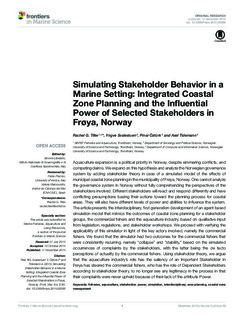| dc.contributor.author | Tiller, Rachel Gjelsvik | |
| dc.contributor.author | Svalestuen, Yngve | |
| dc.contributor.author | Øzturk, Pinar | |
| dc.contributor.author | Tidemann, Axel | |
| dc.date.accessioned | 2017-10-05T11:07:04Z | |
| dc.date.available | 2017-10-05T11:07:04Z | |
| dc.date.created | 2015-10-19T13:03:29Z | |
| dc.date.issued | 2015 | |
| dc.identifier.citation | Frontiers in Marine Science. 2015, 2:90 1-14. | nb_NO |
| dc.identifier.issn | 2296-7745 | |
| dc.identifier.uri | http://hdl.handle.net/11250/2458678 | |
| dc.description.abstract | Aquaculture expansion is a political priority in Norway, despite simmering conflicts, and competing claims. We expand on this hypothesis and analyze the Norwegian governance system by adding stakeholder theory in case of a simulated model of the effects of municipal coastal zone planning in the municipality of Frøya, Norway. One cannot analyze the governance system in Norway without fully comprehending the perspectives of the stakeholders involved. Different stakeholders will react and respond differently and have conflicting presumptions basing their actions toward the planning process for coastal areas. They will also have different levels of power and abilities to influence the system. The article presents the interdisciplinary, first generation development of an agent based simulation model that mimics the outcomes of coastal zone planning for a stakeholder groups, the commercial fishers and the aquaculture industry, based on qualitative input from legislation, regulations, and stakeholder workshops. We proceed with verifying the applicability of this simulator in light of the key actors involved, namely the commercial fishers. We found that the simulator had two outcomes for the commercial fishers that were consistently recurring, namely “collapse” and “stability,” based on the simulated occurrences of complaints by the stakeholders, with the latter being the de facto perceptions of actuality by the commercial fishers. Using stakeholder theory, we argue that the aquaculture industry's role has the saliency of an Important Stakeholder in Frøya has steered the commercial fishers, who has the role of Dependent Stakeholders according to stakeholder theory, to no longer see any legitimacy in the process in that their complaints were never upheld because of their lack of the attribute power. | nb_NO |
| dc.language.iso | eng | nb_NO |
| dc.publisher | Frontiers Media | nb_NO |
| dc.rights | Navngivelse 4.0 Internasjonal | * |
| dc.rights.uri | http://creativecommons.org/licenses/by/4.0/deed.no | * |
| dc.title | Simulating stakeholder behavior in a marine setting: Integrated coastal zone planning and the influential power of selected stakeholders in Frøya, Norway | nb_NO |
| dc.type | Journal article | nb_NO |
| dc.type | Peer reviewed | nb_NO |
| dc.description.version | publishedVersion | nb_NO |
| dc.source.pagenumber | 1-14 | nb_NO |
| dc.source.volume | 2:90 | nb_NO |
| dc.source.journal | Frontiers in Marine Science | nb_NO |
| dc.identifier.doi | 10.3389/fmars.2015.00090 | |
| dc.identifier.cristin | 1281599 | |
| dc.relation.project | Norges forskningsråd: 216607 | nb_NO |
| dc.description.localcode | © 2015 Tiller, Svalestuen, Öztürk and Tidemann. This is an open-access article distributed under the terms of the Creative Commons Attribution License (CC BY). The use, distribution or reproduction in other forums is permitted, provided the original author(s) or licensor are credited and that the original publication in this journal is cited, in accordance with accepted academic practice. No use, distribution or reproduction is permitted which does not comply with these terms. | nb_NO |
| cristin.unitcode | 194,67,25,0 | |
| cristin.unitcode | 194,63,10,0 | |
| cristin.unitname | Institutt for sosiologi og statsvitenskap | |
| cristin.unitname | Institutt for datateknologi og informatikk | |
| cristin.ispublished | true | |
| cristin.fulltext | original | |
| cristin.qualitycode | 1 | |

